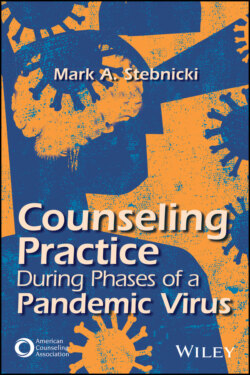Читать книгу Counseling Practice During Phases of a Pandemic Virus - Mark A. Stebnicki - Страница 13
Foundational Principles of a Pandemic Virus
ОглавлениеCounseling Practice During Phases of a Pandemic Virus is a comprehensive and foundational resource for mental health counselors and allied helping professionals. This work identifies, discusses, analyzes, illustrates, and differentiates characteristics of the COVID-19 pandemic from other natural disasters. It offers a compass to facilitate the use of pandemic disaster strategies with adults, adolescents, and children. A key asset of this work is the pandemic risk and resiliency continuum (PRRC) theoretical model, which offers mental, behavioral, and psy chosocial health benchmarks that can potentially be tracked throughout phases of a pandemic virus. The PRRC model has been critically reviewed by a panel of eight experts in disaster mental health response, epidemiology, medical and psychosocial aspects of illness and disability, and applied behavior science. Feedback from the subject matter experts was integrated into and is reflected in the PRRC theoretical model.
Counseling Practice During Phases of a Pandemic Virus is essential reading for members of the counseling, psychology, and public health professions. The ongoing public health crisis has created documented medical, physical, and mental health impacts on our overall well-being. We cannot watch from the sidelines: Failing to respond is not an option if we care to thrive, rather than just survive, during this pandemic virus. So how do we come out of the darkness and into the light and bring new meaning to such catastrophic and traumatic events? How do we facilitate good medical, physical, psychological, emotional, social, psychosocial, occupational, spiritual, and cultural healing during a pandemic disaster?
Most COVID-19 cases are identified and treated in health care settings by medical professionals who have little or no training in the assessment, diagnosis, and treatment of psychiatric conditions associated with mental, behavioral, and psychosocial health conditions. Thus, education and training regarding the screening of mental, behavioral, and psychosocial health issues would enhance patients’ overall medical, physical, and mental functioning. This work is a unique resource for mental health and other allied helping professionals who work in a variety of clinical, school, and community-based health care settings. The intention is to prepare professionals to meet the intense challenges of pandemic viruses in the 21st century. More specifically, this work
1 identifies children, adolescents, adults, and families who are at low, moderate, and high risk for mental, behavioral, and psychosocial symptoms related to pandemic viruses with the intention of triaging the most at-risk persons for follow-up services;
2 discusses the use of specific intake interview questions and appropriate functional assessments to assess low-, moderate-, and high-risk clients;
3 illustrates how risk and resiliency factors occur on a continuum during pandemic viruses using the PRRC theoretical model;
4 differentiates mental, behavioral, and psychosocial symptoms that are healthy-normal and unhealthy-abnormal as they relate to a pandemic virus;
5 appraises salient features of the assessment, diagnosis, and treatment of mental health conditions that interfere with daily functioning in multiple life areas;
6 explores the grief, loss, and psychosocial experiences associated with pandemic viruses;
7 describes the various phases and stages of pandemic viruses that should be anticipated for the application of prevention and treatment approaches;
8 illustrates specific adjustment and adaptation stages of a pandemic virus and how they impact mental, behavioral, and psychosocial functioning;
9 delineates through the phases of pandemic rehabilitation model the essential tasks of navigating and transitioning through critical stages of a pandemic virus;
10 identifies coping and resiliency resources for persons that can serve as a means of prevention and treatment of mental, behavioral, and psychosocial symptoms during phases of a pandemic virus; and
11 discusses how to recognize and prevent the symptoms of empathy fatigue so professionals can function optimally and provide services to those in need during a pandemic disaster.
Overall, Counseling Practice During Phases of a Pandemic Virus provides a new paradigm for professionals dealing with the mental, behavioral, and psychosocial health of individuals, groups, communities, and cultures. The material presented is based on the opinions of subject matter experts; extensive research in disaster mental health counseling; theories of trauma-informed counseling; and clinical applications in the fields of counseling, psychology, traumatology, epidemiology, behavioral health, and public health sciences.2
